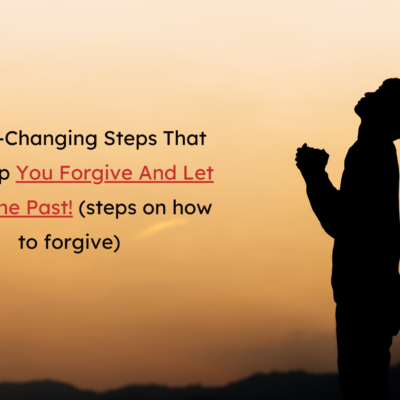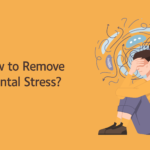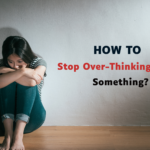10 Life-Changing Steps That Will Help You Forgive And Let Go of The Past: Forgiveness is one of the most powerful actions you can take to improve your mental health and emotional wellbeing. When we hold on to past hurts, grudges, and resentment, we only harm ourselves, preventing growth and happiness. The ability to forgive – whether it’s forgiving others or forgiving yourself – is a critical step in moving forward and creating the life you truly desire.
If you’re ready to free yourself from the chains of bitterness, here are 10 life-changing steps that will help you forgive and let go of the past. (steps on how to forgive)
Also Read:
- How to Deal with Work Anxiety?
- “11 Life-Changing Habits That Could Help You Live to 100—#5 Will Shock You!”
- Traits of Emotionally Unstable Personality. How to Deal with it?
10 Life-Changing Steps That Will Help You Forgive And Let Go of The Past! (steps on how to forgive)
Acknowledge Your Feelings
The first step toward forgiveness is acknowledging your emotions. Whether you’re angry, sad, betrayed, or hurt, it’s essential to accept how you feel without judgment. Bottling up emotions or pretending they don’t exist only prolongs the healing process.
Take time to reflect on your feelings and try to understand where they come from. It’s okay to feel hurt, but allowing yourself to truly feel these emotions is the only way you can release them later. Journaling can be a helpful tool in processing these feelings.
Understand That Forgiveness is for You, Not Them
Forgiving someone is not about letting them off the hook for their actions; it’s about freeing yourself from the burden they’ve placed on you. Holding onto anger or resentment only weighs you down, preventing you from moving on.
Forgiveness is a gift you give to yourself. By forgiving others, you stop allowing their actions to have power over you. The process allows you to regain control of your life and emotional state. Remember, you don’t forgive to benefit them – you forgive to heal yourself.
Put Yourself in Their Shoes
This step can be tough, but it’s essential to truly understand why someone may have hurt you. While this doesn’t excuse their actions, it helps you see the bigger picture. Everyone is carrying their own baggage, and sometimes people lash out from a place of pain.
Consider their background, their own struggles, and their experiences that may have led them to behave in hurtful ways. Developing empathy for others is one of the most transformative ways to soften your heart and make forgiveness easier.
Let Go of the Need for Revenge
A natural instinct when we’ve been wronged is to seek revenge or to get justice. But harboring a desire for payback only feeds the cycle of negativity. As you work on forgiving, remind yourself that revenge doesn’t bring peace or healing.
Instead of focusing on “getting back” at someone, shift your focus to your own growth and happiness. You’ll be surprised at how liberating it is to let go of the desire for revenge and embrace inner peace instead.
Change Your Perspective on the Situation
Sometimes, when we hold grudges, we view the past incident through a distorted lens. We focus on the negative and fail to see the full picture. Try to change your perspective and look at the situation from different angles.
Consider how the event shaped you, what you learned from it, and how it has helped you grow as a person. A shift in perspective can help you see the situation in a new light, reducing the emotional weight attached to it.
Set Boundaries for the Future
Forgiving doesn’t mean that you have to allow people to continue to hurt you. Setting boundaries is crucial in maintaining a healthy relationship with others and with yourself. After forgiveness, it’s important to establish limits that prevent future harm.
This could mean distancing yourself from toxic individuals, saying “no” when necessary, or being clear about what is acceptable behavior in your relationships. Healthy boundaries will help you protect your emotional wellbeing as you move forward in life.
Practice Self-Forgiveness
In many cases, we struggle with forgiving others because we haven’t forgiven ourselves. Perhaps you feel guilty for making mistakes, for hurting someone unintentionally, or for not being able to prevent a bad situation.
Self-forgiveness is just as important as forgiving others. Recognize that you are human, and everyone makes mistakes. Release the shame, guilt, and regret that hold you back. The more compassionate you are with yourself, the easier it will be to forgive others.
Let Go of the Past
Holding onto the past prevents you from fully embracing the present. Whether it’s the pain of an old relationship, a past mistake, or childhood trauma, carrying this emotional baggage weighs you down.
Understand that the past is gone and cannot be changed. Letting go of what happened allows you to live in the moment and focus on the future. Make a conscious decision to release the past and move forward, choosing to leave the negative emotions behind.
Focus on the Positive
When you’re struggling with forgiveness, it’s easy to get lost in the negativity. Instead, focus on the positive aspects of your life. Think about what you’re grateful for and the relationships that bring you joy.
By focusing on the good, you shift your mindset and start attracting more positivity into your life. Gratitude and positivity are powerful tools for healing and forgiveness. The more you concentrate on what’s going right in your life, the less power past hurts will have over you.
Seek Professional Help If Needed
Forgiveness can be challenging, especially if the pain you’ve experienced is deep or ongoing. If you find that you’re struggling to forgive, consider seeking professional help. A therapist or counselor can help you process your emotions and offer guidance on how to move forward.
Sometimes, it’s necessary to work through unresolved trauma with a trained professional to get to a place of healing and forgiveness. Don’t hesitate to seek the support you need to get back on track.








